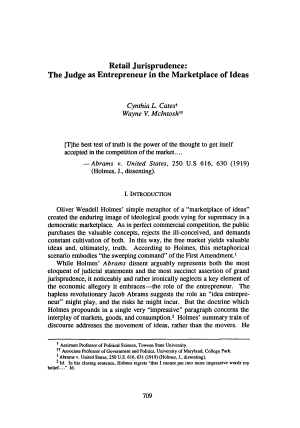Retail Jurisprudence: The Judge as Entrepreneur in the Marketplace of Ideas
September 1995

DISCLAIMER: This text has been transcribed automatically and may contain substantial inaccuracies due to the limitations of automatic transcription technology. This transcript is intended only to make the content of this document more easily discoverable and searchable. If you would like to quote the exact text of this document in any piece of work or research, please view the original using the link above and gather your quote directly from the source. The Sandra Day O'Connor Institute does not warrant, represent, or guarantee in any way that the text below is accurate.
Article Text
(Excerpt, Automatically generated)
Retail Jurisprudence:
The Judge as Entrepreneur in the Marketplace of Ideas
Cynthia L. Catest Wayne V. Mclntoshtt
he best test of truth is the power of the thought to get itself accepted in the competition of the market....
-Abrams v. United States, 250 U.S 616, 630 (1919)
(Holmes, J., dissenting).
INTRODUCTION
Oliver Wendell Holmes' simple metaphor of a "marketplace of ideas" created the enduring image of ideological goods vying for supremacy in a democratic marketplace. As in perfect commercial competition, the public purchases the valuable concepts, rejects the ill-conceived, and demands constant cultivation of both. In this way, the free market yields valuable ideas and, ultimately, truth. According to Holmes, this metaphorical scenario embodies "the sweeping command" of the First Amendment.1
While Holmes' Abrams dissent arguably represents both the most eloquent of judicial statements and the most succinct assertion of grand jurisprudence, it noticeably and rather ironically neglects a key element of the economic allegory it embraces-the role of the entrepreneur. The hapless revolutionary Jacob Abrams suggests the role an "idea entrepre neur" might play, and the risks he might incur. But the doctrine which Holmes propounds in a single very "impressive" paragraph concerns the interplay of markets, goods, and consumption. 2 Holmes' summary train of discourse addresses the movement of ideas, rather than the movers. He
t Assistant Professor of Political Science, Towson
